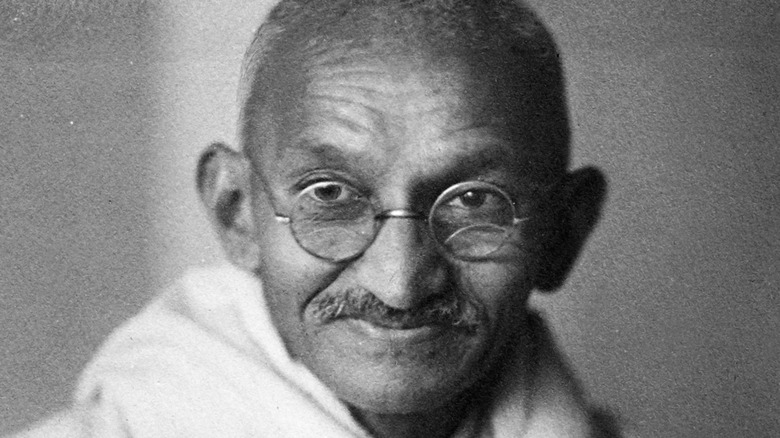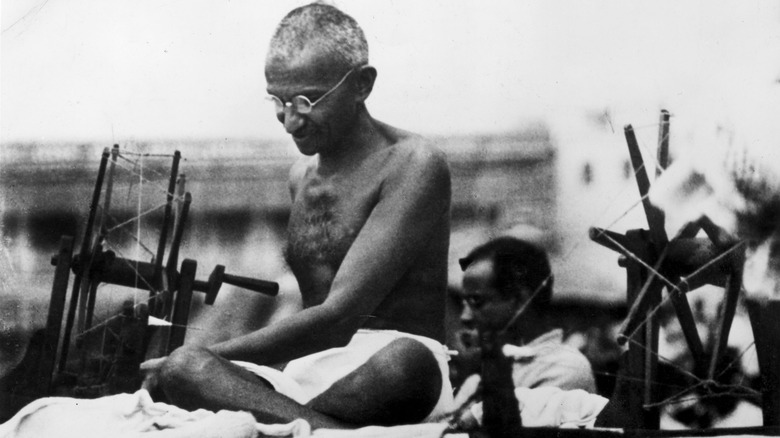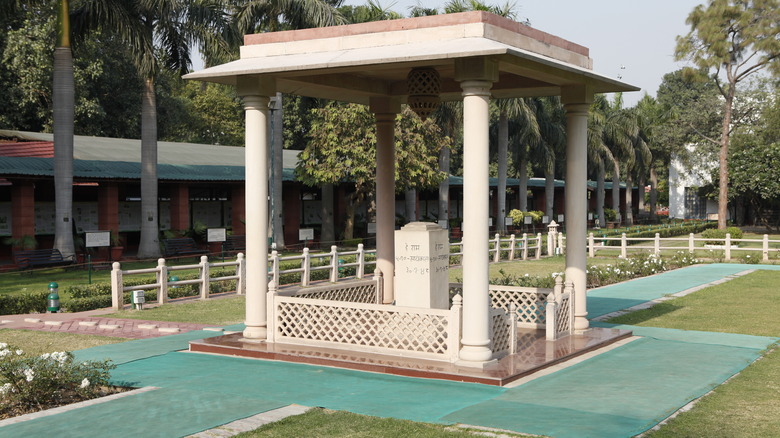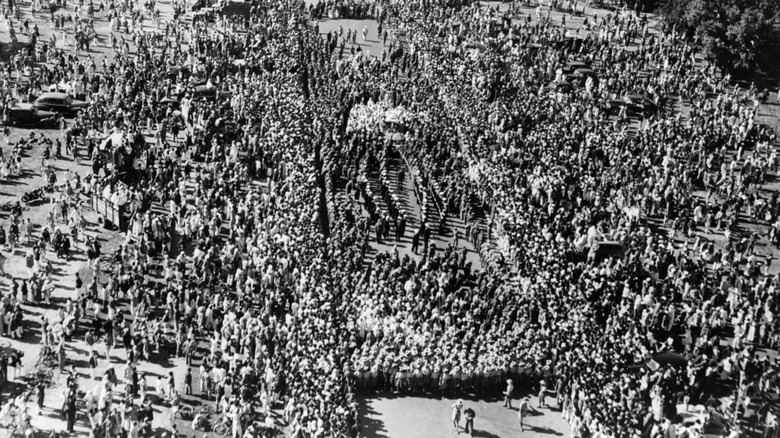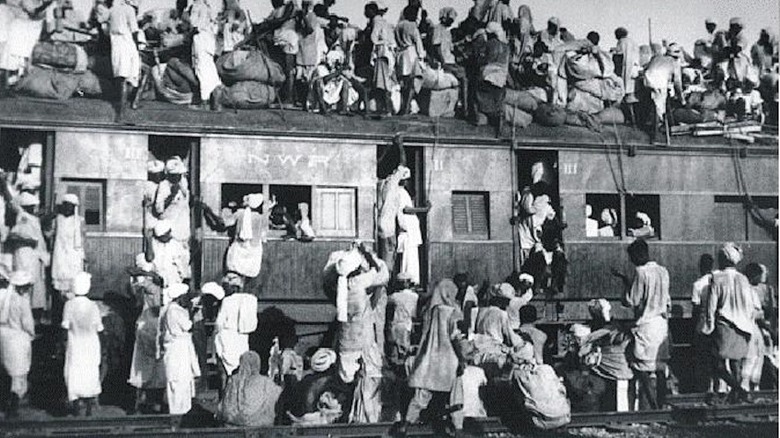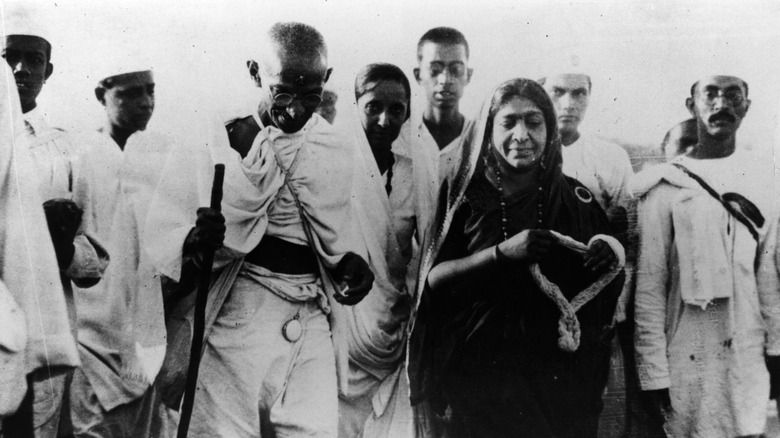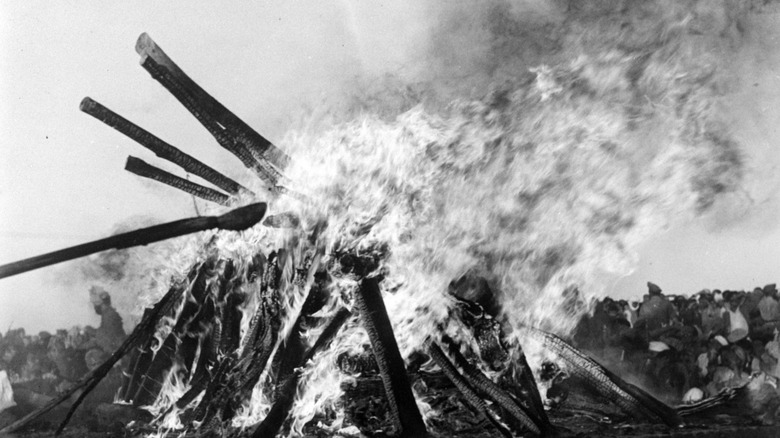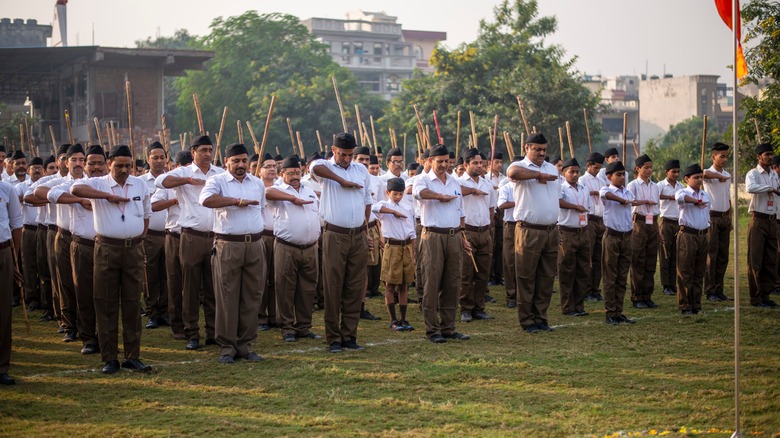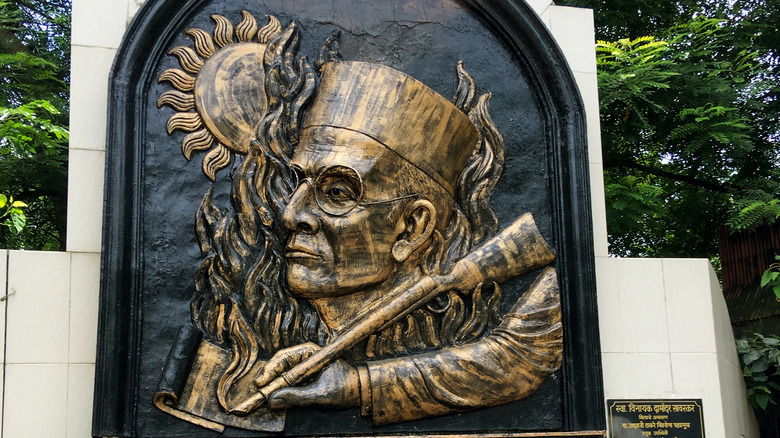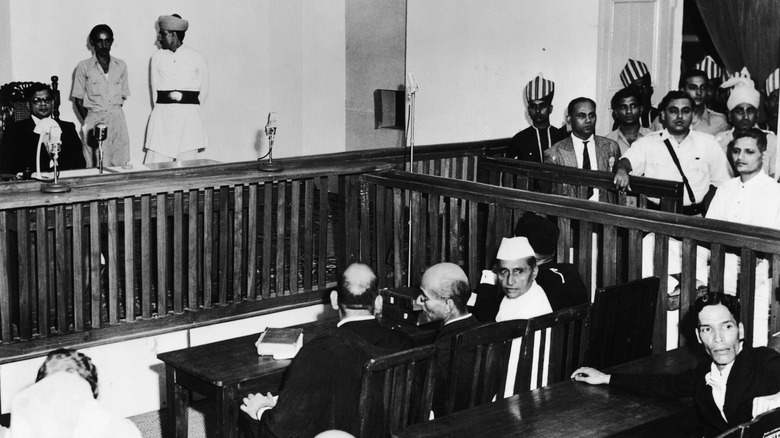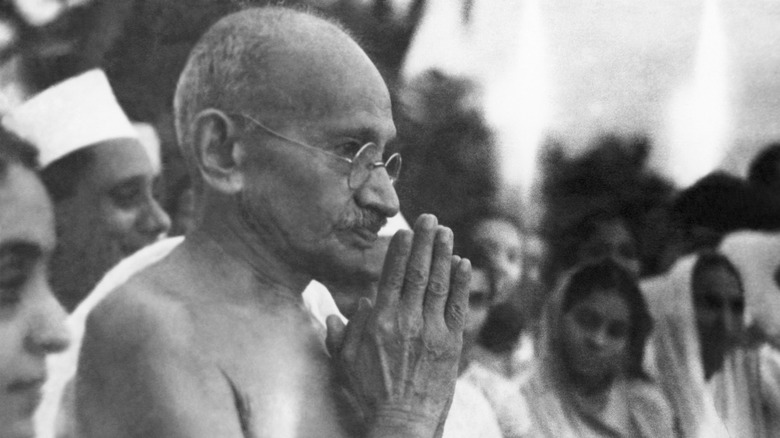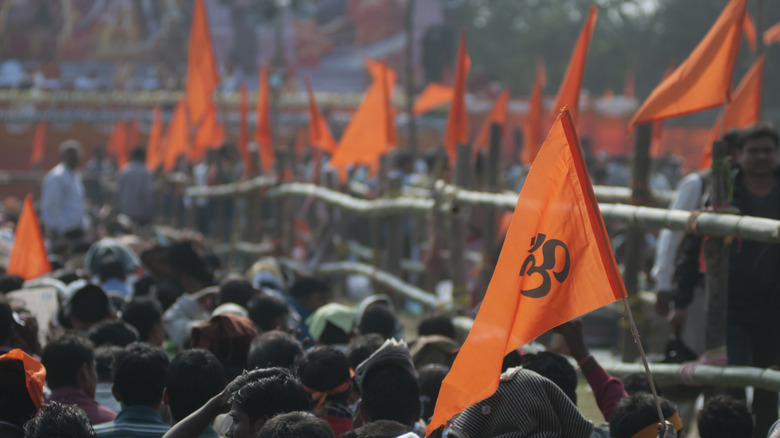Tragic Details About The Assassination Of Mahatma Gandhi
The death of Mahatma Gandhi at the hands of a band of fanatical Hindu extremists resulted in an enormous outpouring of grief around the world. Gandhi had become a pacifist icon and symbol of hope and justice. Using non-violent protest, Gandhi pressured the British to withdraw from Indian soil, showing the world that great change can be effected through peaceful means. His methods would inspire whole generations, influencing great civil rights leaders like Martin Luther King Jr. for many years to come.
However, although Gandhi was a hero to many, in his old age he became a villain to some. When Britain granted India independence it also created a separate Muslim state to the North — Pakistan — a source of great controversy in India. During this great separation, sectarian violence exploded across the country while legions of men and women crossed the new border in both directions. Throughout 1947, India was shaken by rioting while Gandhi continued to fast and campaign for peace.
Asking his fellow countrymen to learn to tolerate one another, Gandhi peacefully cooperated with the Muslim League and pushed for non-violence. But in his final years, this made him a target of hatred in some quarters. Even today, some Hindu nationalists deeply dislike the "Father of the Nation" (India) for his role in Partition. Ultimately, Gandhi's final bid for peace would result in his death on a dark January day in 1948.
Gandhi knew he was probably going to get murdered
Mahatma Gandhi's death shocked the world, but Gandhi himself knew it was coming. Leading up to his murder on January 30, 1948, Gandhi had already survived at least six attempts on his life. The deeply spiritual Gandhi seems to have accepted in advance that he was likely to die in a violent manner as a result of his views. His respectful attitude toward the Muslim population of India, as well as his stance on Partition, made him a prime target for fanatics. On January 20, just ten days before his death, Gandhi narrowly avoided a bomb set off by a group of Hindu extremists. He responded with remarkable calm after the attack, stating that he was ready to die smiling should he be attacked again.
On the morning of Gandhi's actual death, he even joked about his own demise. The then-78-year-old Gandhi met with a doctor to talk about a bad cough. The Times of India reports that after taking a small dose of penicillin he quipped to the doctor "If I were to die of disease or even a pimple, you must shout to the world from the house tops, that I was a false Mahatma [sage] ... if an explosion took place or somebody shot at me and I received his bullets on my bare chest, without a sigh and with Rama's name on my lips, only then you should say I was a true Mahatma."
Gandhi was shot three times at point-blank range
The day that Mahatma Gandhi was killed he was heading to a peaceful prayer meeting with two of his grand-nieces. Gandhi had been staying at Birla house Mansion in New Delhi, fasting in protest against the recent violence over Partition. Despite the fact he had nearly been killed just 10 days earlier, Gandhi refused to employ any security and continued to interact with people as normal. Sadly, this meant it was easy for the gunman to reach him, and the shooter simply approached the aged sage from across the lawn.
The shooter, Nathuram Godse, greeted Gandhi with a bow, his palms pressed together, before pulling out a beretta and firing at him three times. The bullets hit Gandhi in the chest, the groin, and the stomach, and he immediately collapsed in front of a crowd of shocked onlookers. A sizable group had gathered there that day, as they often did, eager to catch a glimpse of the Father of the Nation.
Some say that Gandhi cried out to god as he fell, but witness accounts are muddled. Wounded and dying, he was carried back into the house. Being advanced in age, and having been shot at point-blank range, there was no hope to save him; Gandhi died in just half an hour, and his body was displayed on the front lawn, illuminated by a spotlight. As news of the disaster spread, India and the world at large went into mourning.
The furious crowd nearly lynched the assassin
When Mahatma Gandhi crumpled to the ground, the assassin turned his gun on himself. However, the furious crowd wouldn't allow Nathuram Godse to end his life on his own terms. A quick-thinking air force sergeant knocked Godse's gun away before he could lodge a fourth and final bullet in his own brain.
Next, the sergeant proceeded to turn his own gun on the killer, and many people in the crowd were driven into a frenzy, attempting to cane the shooter with sticks. Cries of "kill him!" rang through the throng while police plunged into the fray to stop the sergeant from shooting the assassin. Springing into action, an American diplomat in the crowd, Herbert Reiner, got there first. Clutching the shooter by the shoulders, he handed him over to the police, and they were able to drag him away before he could be murdered by the angry mob.
After Gandhi died, crowds outside Birla swelled in size as the hours dragged on, and India's outpouring of grief in the days that followed was massive. Almost a million people had gathered in Delhi by the next day to attend one of the biggest funerals in history, and they came together to scatter rose petals over Gandhi, who was carried to a pyre and burned.
The man who shot Gandhi was a Hindu extremist
Nathuram Godse, the man who fired the fatal shots, was a Hindu extremist with a long list of grievances against Mahatma Gandhi. Godse was a member of the nationalist group the Hindu Mahasabha as well as the Rashtriya Swayamsevak Sangh (RSS), a paramilitary group affiliated with India's modern right-wing Bharatiya Janata Party (BJP) party.
Like many other Hindu nationalists who subscribe to the school of thought known as "Hindutva," Godse was hostile to Muslims in India. Those who identify with the Hindutva label often characterize Muslim Indians as foreign Islamic invaders, who have occupied India from the time of the Moghul Empire. Seen through this lens, the creation of Pakistan as a separate Muslim state from the rest of India caused a great deal of anger, especially after war broke out over the disputed Kashmir region.
Gandhi practiced Hinduism, but nonetheless, he encouraged peaceful cooperation between the two newly independent states. During the transition period, he even fasted to push India to release funds to Pakistan. Godse — who believed Gandhi was part of an anti-Hindu, pro-Muslim plot — was incensed, particularly given the recent violence that had occurred between Muslims and Hindus. In the court speech he gave at his trial, Godse referenced Gandhi's positive attitude towards Muslims, as well as his pro-Pakistan fast, among his reasons for carrying out the assassination. In his eyes, Gandhi had become too powerful and was jeopardizing the lives of his fellow Hindu countrymen.
The assassin had tried to kill Gandhi twice before
Nathuram Godse had attempted to attack Mahatma Gandhi on at least two other occasions before he finally killed him. Although Gandhi knew this, he never pressed charges against him.
One of these attempts occurred in 1944, shortly after Gandhi was released from prison. One evening in July, Godse and a group of his companions rushed at Gandhi while he was attending a prayer group at an old high school. Godse himself was wielding a knife but two bystanders successfully disarmed him, giving Gandhi time to escape. Remarkably, Gandhi asked his saviors to be gentle with Godse, and he even invited his would-be assassin to meet with him personally in order to smooth things over. Sadly, Godse refused the offer and was never held accountable for the failed attack.
Just two months later, Godse and a gang of men moved to attack Gandhi again, charging at him outside an ashram in Sevagram. This time, Gandhi was on his way to attend a highly controversial meeting with another great politician of the age, Muhammad Ali Jinnah, the leader of the Muslim League and father of Pakistan. This time the group was stopped by the crowd and questioned by the police. Although Godse was once again carrying a small knife about his person, he and his gang were released.
Rioting ensued after Gandhi died
Ironically, the aftermath of Mahatma Gandhi's death led to widespread violence. Shortly after the assassination, Prime Minister Pandit Nehru told the world over the radio that the great man had died, and discontent erupted across India.
When word spread that Gandhi's killer had been a Brahmin — a high-caste Hindu — Brahmins were attacked across the country and there were outbreaks of arson. The New York Times reported that at least 15 people were killed in Bombay alone, and police fired into the crowds during the turmoil. Mobs also attacked the offices of the RSS and the Hindu Mahasabha, political groups that the shooter Nathuram Godse had been a part of, and several people connected to the killer were forced into hiding. The city of Poona, where Godse lived, was awash with angry crowds on the lookout for Brahmins and the assassin's family. Across India, the homes and businesses of Brahmins who had nothing to do with the killing were attacked. People who shared Godse's name, but were of no relation to him, feared for their lives.
The assassination may not have been properly investigated
Nathuram Godse and the four other men who were found guilty of Mahatma Gandhi's murder came from fairly humble backgrounds. It has long been assumed that the group had the support of some more powerful political backers, although there is no concrete evidence for this. Godse's membership of the RSS paramilitary group, for example, has often raised eyebrows, although for years the group has insisted that he quit the organization before committing the murder. On the other hand, Godse's brother, who was among those jailed for the conspiracy, has claimed that neither of them ever left the RSS but that they publicly stated as much to protect the organization.
Fingers have also been pointed at the Hindu Mahasabha, with whom the assassins were also involved. There is some support for this argument, given that the leader of the Gwalior branch of the Hindu Mahasabha gave Godse the pistol he used to dispatch Gandhi. Doctor and ardent nationalist Dattatraya Parchure confessed to his role in the killing in court, but he got off on a technicality.
While none of this proves either organization was officially involved in the murder, it will probably never be clear one way or another because neither group was investigated at the time. This is particularly troubling given that members of both organizations had previously provided money and backing for a series of violent anti-muslim attacks conducted by Godse's gang.
One of the conspirators, a famous politician, may have escaped justice
Some of the details surrounding the murder of Mahatma Gandhi are so controversial that the case was reopened with the 1969 Kandar Commission Report. One of the biggest question marks about the murder relates to the possible role of a prominent politician, Vinayak Damodar Savarkar, who was a member of the Hindu Mahasabha and was famous for his fervent nationalism and controversial support of the Nazis and their ideas about ethnic purity. Sarvakar was arrested and charged in connection with Gandhi's killing in the 1940s, but the charges didn't stick.
The evidence against Sarvakar was provided by an arms dealer, Digambar Badge, who gave an eyewitness account of a meeting between Sarvakar and two of the conspirators: Nathuram Godse and Narayan Apte. Badge had previously provided the men with weapons for their prior assassination attempt on January 20, 1948. According to him, Saravakar told the men to kill Gandhi.
Apte and Godse, on the other hand, claimed that Sarvakar had nothing to do with the murder, and the defense successfully argued that because Badge had been standing outside when the group met, he may not have heard all of what was said. After Sarvakar died, the Kandar Commission reviewed the evidence and concluded he most likely was involved, in the light of new testimony given by other eyewitnesses. The new evidence proved that the assassins had met with Sarvadkar on another occasion, between the first and second assassination attempts.
The assassin claimed the murder was his moral duty in trial
At his trial, Nathuram Godse not only showed no remorse for the killing, but he also gave a five-hour speech explaining his ideology and motives. Rather than employing a lawyer, Godse spoke for himself and tried to persuade the court of the nobility of his cause. Most of his speech was a rant about the (in his eyes) unjust creation of Pakistan on Indian land, and Gandhi's positive attitude toward Muslims. During the speech, he also reassured the court that he did hold some of Gandhi's actions in high regard, noting that he did bow to the great man before shooting him.
Godse's argument ran that Gandhi had gotten too big for his boots and ultimately helped bring ruin to India by supporting the creation of Pakistan. As a result, he claimed that Gandhi "had to pay the penalty of his life for his unjust, anti-national and dangerous favoritism towards a fanatical section of the country."
He specifically objected to Gandhi's philosophy of non-violence, stating that "honour duty and love of one's own kith and kin and country might often compel us to disregard non-violence. I could never conceive that an armed resistance to the aggressor Is unjust." Godse was adamant that given the widespread violence that had broken out between Muslims and Hindus across India, it was every Hindu's right to defend themselves. By extension, it was also Godse's duty to protect India from Gandhi.
Godse and Apte were hanged despite calls for clemency
At the trial, three men were given prison sentences for their involvement in planning the murder, and Nathuram Godse and Narayan Apte were sentenced to death. The jailed men included Vishnu Karkare, Madanlal Pahwa, and Nathuram's brother, Gopal Godse. Gopal Godse, in particular, served a 16-year jail term, and even in his winter years, he maintained that Gandhi was a bad person who had done great damage to India.
After the sentencing, some of Gandhi's followers sent the government a great flurry of clemency requests on behalf of the two men who were condemned to die, citing their personal objections to capital punishment as well as the philosophy of Mahatma Gandhi himself. Two of these requests came from Gandhi's own sons, and Ramdas Gandhi in particular wrote to Godse himself.
In their correspondence, Godse expressed a desire to meet with the younger Gandhi, stating "If you actually see me and have a talk with me, either sentimentally or on reason, who knows you may be able to change me and make me repent or I may change you and make you realise my stand ... I express my utmost regrets as a human being for your sufferings due to the death of your revered father by my hands." Alarmed by the exchange, India's Prime Minister advised against any such meeting, and Godse and Apte were both hanged.
Some people in India today still celebrate the assassination
Although Mahatma Gandhi is revered by many, his legacy is still divisive in India. Some right-wing Hindus are still resentful about Partition and choose to venerate Gandhi's killer, Nathuram Godse, instead. Those who celebrate Godse believe that Gandhi really did betray the newly independent India. Under Prime Minister Narendra Modi's right-wing BJP party, India's nationalists have become more outspoken in general. Modi himself is after all a member of the RSS, just like Godse was — although the organization has historically rejected Godse as a killer.
In 2019, six men were arrested in the city of Surat for celebrating Godse's birthday (via The Indian Express). The group was charged with intent to cause a riot and the promotion of prejudicial views, and the local congress reacted fast to condemn their activities. However, this one event is just the tip of the iceberg. Requests for Godse memorials have exponentially increased across India in recent years, and while images of Gandhi are increasingly subject to vandalism — Godse's face can now be found in places of pride in some Hindu temples.
